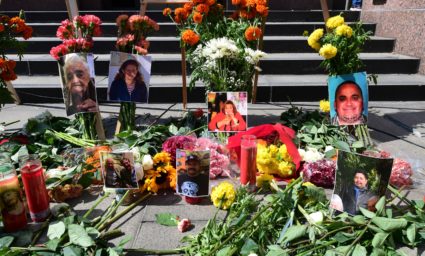
In 1984, a shooting on a New York City subway thrust Bernie Goetz into the center of the national spotlight.…

Days after the COVID-19 death toll in the U.S. surpassed 500,000, an Arizona congressman is pushing to designate a national day of remembrance for victims and survivors.
Building on the grassroots support generated by Marked by COVID, an advocacy group founded during the pandemic, Democratic Rep. Greg Stanton of Arizona introduced a resolution in the House on Friday morning that would recognize March 1 as COVID-19 Victims and Survivors Memorial Day.
According to the resolution, the day is meant to mark the many lives lost to COVID in the U.S. and globally, and acknowledge the ongoing grieving and widespread loss felt throughout the pandemic.
"This is going to be a national trauma for a long period of time," Stanton told the PBS NewsHour. "It's important that we recognize that. It's important that the United States Congress, representing the people, create this memorial day to tell people that have lost loved ones or they themselves have had this horrible virus: 'We see you, We hear you. We stand with you. We support you. We want to lift you up on this day.'"
Speaking from the House floor Monday, Democratic Rep. Greg Stanton of Arizona said a national memorial day for COVID-19 victims and survivors would be an "important marker for all those affected across the country." Video by PBS NewsHour
Stanton and Marked by COVID would like the observance to become an annual tradition, which requires bicameral support in Congress. At this time, there's not a companion bill in the Senate, Stanton's office said.
READ MORE: Why we need COVID memorials now — and for the future
There has been a groundswell of support for such a day from dozens of cities and states across the country, including Tacoma, Washington, Cincinnati, Ohio, and Myrtle Beach, South Carolina. Many of them have issued proclamations or shown their support for March 1 as a national day of remembrance this year. According to Marked by COVID, 60 mayors from both parties have also agreed to co-sponsor a U.S. Conference of Mayors Resolution to recognize the day.
The World Health Organization officially declared the novel coronavirus a pandemic in March 2020, prompting state officials across the country to issue stay-at-home orders amid escalating cases. By the end of the month, the number of COVID deaths passed the 100,000 mark.
Throughout the month, "communities in every State began to experience increased loss of life, and families lost fathers, mothers, brothers, sisters, sons, daughters, and neighbors from the virus," the resolution says.
After the resolution's introduction Friday, Stanton described how his family and friends had been affected by COVID. His wife was hospitalized after contracting the virus, which also claimed the lives of his daughter's basketball coach and the father of her best friend.

Kristin Urquiza, co-founder of Marked by COVID, said her organization felt it was "necessary to really carve out a time and space in the calendar" to commemorate all the lives lost to COVID as the first steps in an "ongoing journey of recognition."
"When the last shot goes into the arm, when we've reached herd immunity, when we're able to declare victory on COVID-19, we will still have lost hundreds of thousands of people in the U.S. and millions around the world who were irreplaceable members of our communities and families," she told the PBS NewsHour. "And we are on the verge of having a pandemic of grief. So many of us, because of the nature of this virus, haven't been able to be with our loved ones, be with our family, be with our community, practice our traditional cultural ways of grieving."
Urquiza, who lost her father Mark to the virus last year, said there's a level of trauma that stems from the way the virus separates us from our loved ones, especially during a period of transition after a loss. Urquiza said an act like an annual memorial day is a form of recognition "that is such an essential piece of moving through trauma, moving through grief, to be able to properly mourn and turn the page on this at some point in the future."
Urquiza's obituary for her father, who died at age 65, was heavily critical of state and federal leaders' handling of the pandemic. Without naming former President Donald Trump and Arizona Gov. Doug Ducey, she wrote that her father's death "is due to the carelessness of the politicians who continue to jeopardize the health of brown bodies through a clear lack of leadership," as well as downplaying the severity of the crisis.
Organizers for the Democratic National Convention invited her to speak at the August 2020 event about her experience losing her father. In her video message, Urquiza named Trump, saying the former president "may not have caused the coronavirus, but his dishonesty and irresponsible actions made it so much worse."

Trump never held a national moment of remembrance for COVID victims and their families. In that absence, makeshift COVID memorials, big and small, have been erected to visualize the scale of human loss amid the pandemic.
When President Joe Biden took over the White House this year, his administration vowed to make continual acknowledgments of COVID victims, first with a lighting ceremony on the eve of his inauguration and then, most recently, a candle lighting ceremony as the U.S. hit 500,000 lives lost to the virus.
Eulogizing those people on Monday, Biden acknowledged the nation's loss but also pointed to "sunny days" ahead.
"This nation will know joy again," he said. "And as we do, we'll remember each person we've lost, the lives they lived, the loved ones they left behind."
READ MORE: How this artist visualized the scale of human loss to COVID-19
Sustain our coverage of culture, arts and literature.